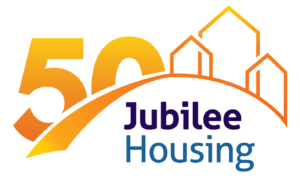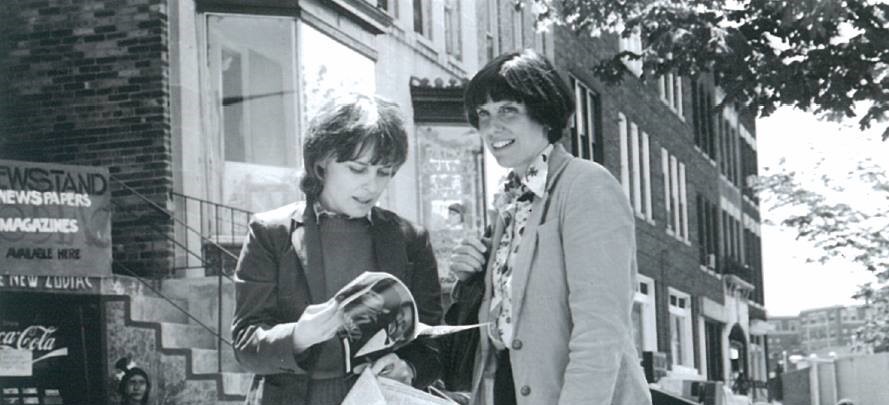50th Anniversary Stories
Jubilee Housing: Built on the Foundation of a Calling
by Darrel Drobnich
Jubilee Housing has come a long way over the last 50 years with the help of many volunteers, residents, staff, partners, donors, and supporters.
Jubilee Housing was founded in 1973 when members of the ecumenical Church of the Saviour saw a need to address substandard housing in the heart of Washington, DC. The Church was founded in 1947 by Rev. Gordon Cosby, who served as a chaplain in the Glider Infantry Unit of the 101st Airborne Division during World War II. The experience changed his view of how faith is lived out in the world.
In 1960, the Church of Saviour opened Potter’s House, the nation’s first church-run coffee house, in Adams Morgan to welcome everyone of all backgrounds to explore life’s big questions. It became nationally known and duplicated. Around The Potter’s House’s tables, people began to plan and implement new ministries and non-profits to respond to the many needs of the neighborhood and city.
Following Bloody Sunday on March 7, 1965, when hundreds of peaceful civil rights marchers were tear-gassed and beaten by police, Rev. Martin Luther King sent a telegram to hundreds of clergy that Monday, urging them to join him in Alabama to march for justice. Cosby answered that call, and when he returned, he asked he said to his small congregation in Adams Morgan, “Selma … is every community in our nation. Washington is Selma, too.”
Further awakened by the 1968 riots following the assassination of Dr. Martin Luther King, Jr., members of the church became very concerned about changes in the neighborhood and began to connect more deeply with its neighbors, especially those in need.
Years of racially motivated disinvestment had begun to take their toll on the area, and hundreds of families were living in slum conditions while paying exorbitant rents. Many buildings in the neighborhood were rat-infested, not maintained, and often did not have heat or hot water. Many land speculators looked to move people out to gentrify the area.
Terry Flood, Barbara Moore, and Carolyn Banker Cresswell were friends and members of the church and were concerned about the stories they learned about the living conditions of their neighbors. They approached Jim Rouse, a successful developer in the area, with a big idea – to purchase and transform the neglected Ritz and Mozart apartment buildings, which consisted of 90 units in total. They had a vision but didn’t have the development, financial, or construction experience to make it real. Rouse was apprehensive at first. Undaunted, Flood, Moore, and Banker Cresswell were committed to making good homes possible for their community and made a non-refundable deposit to buy the buildings on their own.
Inspired, Rouse helped them secure $625,000 to complete the purchase and $125,000 toward repairs. With this investment, the church, Terry, Barbara, and Carolyn formed Jubilee Housing. Church members, volunteers, and residents banded together to put in more than 50,000 volunteer hours to clean up the buildings and fix 940 code violations within a matter of months. As funds became available, professional building contractors made further, more extensive renovations.
As the city has grown, it has become increasingly more difficult for longtime residents to stay in their communities, or for low-income residents to move into newly thriving neighborhoods, cutting them off from the District’s rising prosperity. In response, Jubilee’s work has shifted to focus on connecting people to the city’s prosperity through our model of Justice Housing®, which provides high-quality, deeply affordable homes with easy access to programs and services in thriving neighborhoods.
Today, Jubilee Housing is operating 13 properties with 464 units that provide safe housing to over 800 residents in Adams Morgan, Columbia Heights, and Mount Pleasant neighborhoods. It also has five properties currently under construction or predevelopment, representing another 170 units and the region’s first rooftop aquaponics farm owned by an affordable housing-based organization. The farm is expected to produce around 13,000 plants of fresh fruits and vegetables per month and includes a workforce training program for people out of incarceration.
Jubilee’s comprehensive programs for residents range from early childhood education and afterschool and summer programs for school-aged youth to scholarships for college-bound students to support nutrition, wellness, and financial capability for residents of all ages.
For over 50 years, Jubilee staff and volunteers have been fortunate to witness the success and growth of many residents. We have seen the powerful impact that an affordable apartment in a safe and supportive environment with tailored wraparound services can have, not just for the well-being of residents but for the city as a whole.


